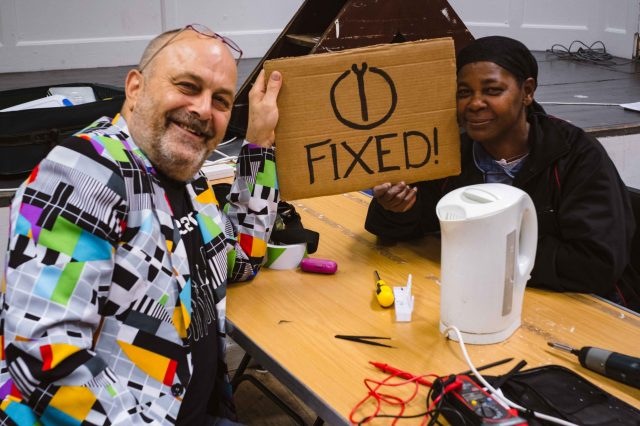
We appeared today on BBC Breakfast and various BBC radio shows, talking about the importance of repair and changes we need to be able to repair the stuff we own and keep it longer. Here is a summary of what The Restart Project does and how we can fix our throw-away economy.
What you can do
Get involved with our work:
- Wherever you live, stay informed via our monthly newsletter
- Join our community by fixing, sharing skills or organising community repair events
- Ask your local repair group to sign The Manchester Declaration
- Look out for a European-wide Right to Repair campaign, coming soon
About us
The Restart Project helps people learn how to repair their broken electronics, through our Restart Parties: free community repair events where participants can work with a skilled volunteer to fix anything with a plug or a battery.
They’re spaces for learning skills and reflecting about how we consume in the first place. Repair is fun, it’s social, it saves money, and helps us be creative and constantly learn.
We’re based in London and we help other groups get started. And we’re part of a larger movement of community repair groups across the world, which keeps growing.
Last year, we held Fixfest UK, a UK-wide event in Manchester with 59 activists from 25 groups from Belfast to Pembrokeshire to Leeds. Together we drafted The Manchester Declaration, calling for more repairable products.
Why repair
Repair is simply common sense. People are tired of throw-away products: they remember when appliances lasted longer. One day we will look back at the past couple of decades and just shake our heads.
Electronics are very much our blind spot. It’s amazing to see people getting involved in plastic waste, food waste, fast fashion. But electronics have massive invisible environmental impacts too.
The UK is the world’s second highest producer of e-waste per capita, producing 55 pounds per year (source: United Nations University). The other top producing countries are much better at recycling than we are: between a quarter and a third of all e-waste ends up in landfill in the UK
What we can repair – and can’t
We also collect data about repairs across our network. The most popular products we fix at our events are laptops, mobiles, small kitchen appliances, hi-fi components and lamps. We repair a little over half of what is brought on the spot. A fifth is end-of-life.
With the rest, repair could be possible, but there are barriers. Often we refer unfinished repairs to professionals, however they share some of the same barriers we experience:
- lack of access to spare parts
- lack of repair documentation and tools
- product design often making disassembly impossible
All of these can be addressed by new European measures for ecodesign. We’ve been campaigning in support of these, for fridges, lamps, televisions and displays, dishwashers, and washing machines. This season of votes by member states can set important precedents that can impact the most popular consumer electronics too.
There is massive public support to bring down these barriers, and for us to have the Right to Repair the stuff we buy. People overwhelmingly want more repairable products and they think the government should ensure this – more and more studies show this, both at European level and in the UK. A study just published by the Green Alliance proves public support for repairable products.
I’m an habitual repairer! My most notable repair was whilst lying in hospital recovering from open heart surgery. I opened up a fellow patient’s defunct Nexus 7 with a pair of nail clippers, fixed a dodgy circuit and handed it back, fully functional, to a very happy customer.
Brilliant! Recently we had our 1940’s ESSE sovereign boiler repaired. Uk distributer records didn’t go back far enough but they remade the boiler unit By hand and found a trained fitter who travelled 175 miles and fixed it in 2 days! Total cost, under £1,000! A new £8,000 one+ fitting would be completely unaffordable! Can they win an award?
Good morning, I’ve just seen restart on the BBC breakfast TV show, Brilliant. I have always tried to repair some times to the annoyance of my partner. I have been taking things apart since I was about 8 and also put them back together. They were not always brocken.
Kind regards
Andy Edwards
Hi Restart Team,
It all sounds very interesting. We have been helping people repair their gadgets for over 6 years now and We would love to be part of it.
Wonderful, just found you guys from a BBC news item……a group of people who think like me. I love fixing and repairing, hate throwing stuff. Electronics am not too hot on, but will now be looking to attend one of your local events, and increase my knowledge